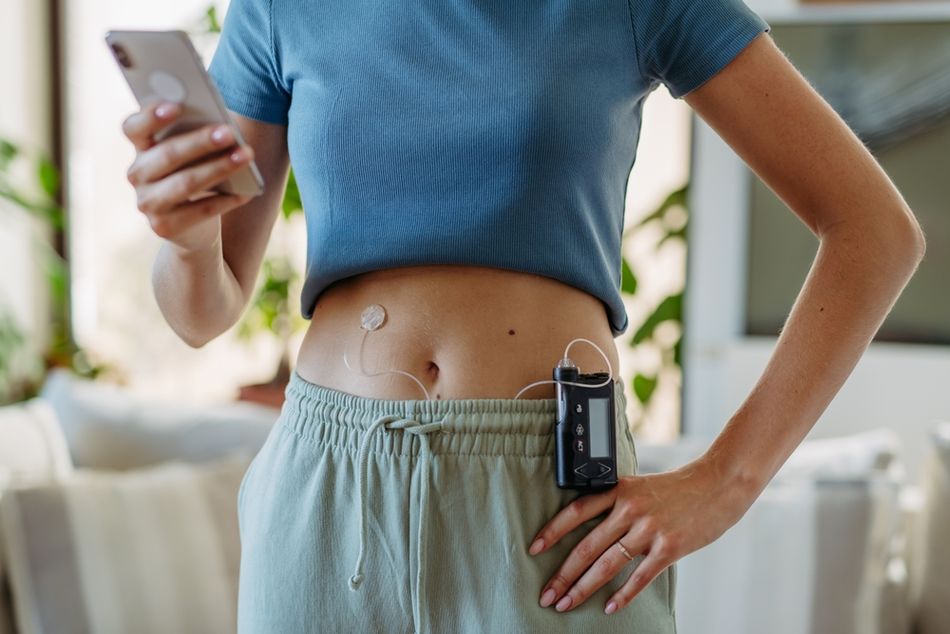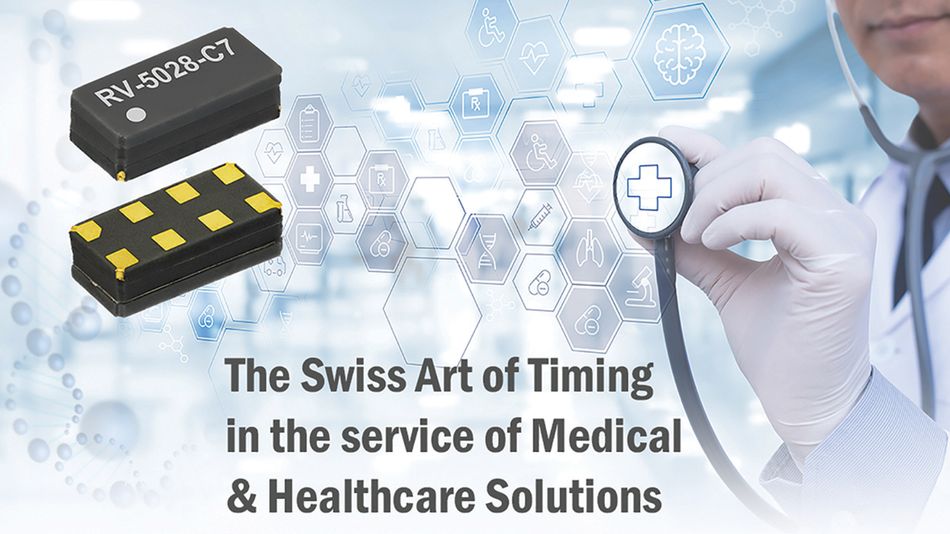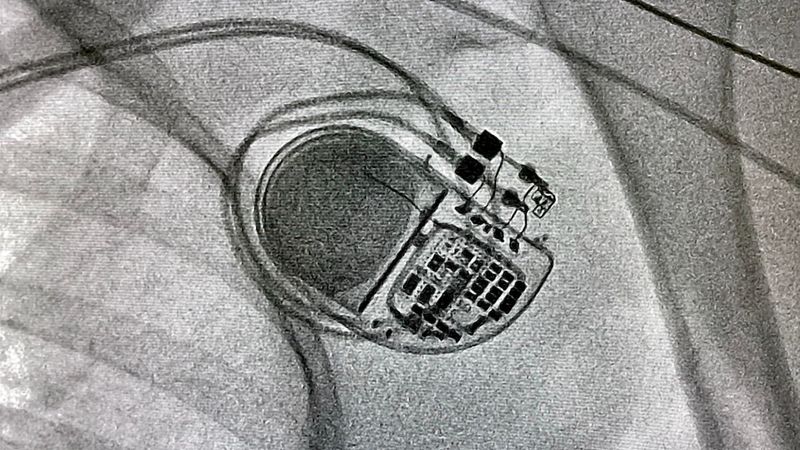The Heartbeat of Innovation: How the RV-5028-C7 Medical RTC Module Powers the Next Generation of Implantable Medical Devices
Real-time Clock (RTC) modules are the specialized components designed to maintain accurate timing even in medical devices such as neurostimulators, pacemakers, insulin pumps, and other essential devices.
Implantable medical devices rely on precise timekeeping to ensure their smooth operation. Real-time Clock (RTC) modules are the specialized components designed to maintain accurate timing even in medical devices such as neurostimulators, pacemakers, insulin pumps, and other essential devices.
This article discusses the critical role of RTC modules in medical technology, and, in particular explores the features and advantages of the Micro Crystal's RV-5028-C7 Medical RTC module.
The Critical Role of RTC Modules in Medical Technology
What are RTC Modules?
Real-time clock (RTC) modules are specialized electronic components that maintain precise timekeeping. RTC modules are optimized for applications where accuracy and reliability are critical, often operating independently of a system's main power supply to ensure uninterrupted time measurement. In medical technology, their significance becomes even more pronounced. The ability of RTC modules to perform consistently makes them critical in ensuring the safe and effective operation of life-saving medical technologies.
Applications in Medical Devices
Implantable medical devices, such as neurostimulators, cardiac monitors, and insulin pumps, are important in managing and improving patient health. These devices rely on precise timekeeping to perform their functions accurately and efficiently. For instance, neurostimulators must deliver therapeutic electrical pulses at precisely timed intervals to regulate neurological activity, and cardiac monitors and pacemakers depend on accurate timing to monitor heartbeats and respond to abnormalities in real time.
Similarly, defibrillators require accurate timekeeping and timestamped events to assist physicians in evaluating both the heart's functionality and the defibrillator system itself. Defibrillators are critical for patients at risk of life-threatening arrhythmias, as they deliver controlled electrical shocks when abnormal heart rhythms are detected. The timestamping capabilities of RTC modules help physicians assess both the heart's behavior and the defibrillator's response during routine evaluations. In scheduled follow-ups that usually occur every 3 to 6 months, healthcare providers analyze recorded event data, including heart activity and any corrective interventions by the defibrillator. Hence, accurate timing ensures a clear identification of when specific cardiac events occurred, aiding in device optimization and overall patient care.
Insulin pumps also require meticulous time-stamping to ensure the correct dosage is administered at the right moment to help patients maintain stable glucose levels. RTC modules are also crucial in smart implants, typically enabling precise data logging and timestamping functionalities for monitoring strength sensors within knee implants. These sensors track muscle performance and joint function. RTC modules used in these knee implants maintain precise timestamps for collected data, which help physicians monitor a patient's recovery progress over time, assess therapy effectiveness, and adjust treatment plans accordingly. This accurate timekeeping supports more personalized rehabilitation strategies.
The synchronization of operations and logging of critical data provided by RTC modules is fundamental to the reliability and effectiveness of these medical technologies.

Challenges in Medical Environments
Implantable medical devices are subjected to constant physiological movements, including vibrations from muscle contractions and shocks from sudden body motions. Such mechanical stresses can degrade electronic components over time, potentially leading to malfunctions or inaccurate timekeeping. Moreover, a reliable implantable device should function perfectly for 20 years or more, often without direct maintenance or battery replacement. This necessitates long-term stability and ensures that critical functions like data logging and synchronized operations remain precise throughout the device's lifespan. Therefore, the RTC module within these implants should be robust enough to not only withstand these conditions but also maintain accuracy and efficiency.
Features and Advantages of the RV-5028-C7 Medical RTC Module
Micro Crystal's RV-5028-C7 Medical RTC module is engineered to meet the rigorous demands of implantable medical devices. For example, one of the very important advantages offered by RV-5028-C7 is its extremely low power consumption. It operates at just 45 nA at 3 V in timekeeping mode, which helps extend the lifespan of implantable devices by ensuring that they function reliably for years without frequent battery replacements or recharging.
Another major benefit of the RV-5028-C7 is its ability to optimize power usage in applications with periodic activities, such as therapy sessions in neurostimulators or wireless communication in medical implants. The module allows the main microcontroller unit (MCU) to remain in a low-power sleep state while it continues to manage timekeeping and scheduled operations. This ensures that energy is only used when necessary, improving overall power efficiency without compromising functionality.
The RV-5028-C7 is designed with miniaturization in mind. It is remarkably compact, measuring only 3.2 × 1.5 × 1.0 mm and weighing just 12.9 mg, which makes it ideal for modern implantable devices where size and weight constraints are critical to patient comfort and surgical feasibility.
However, its small size does not hinder its performance in any shape or form; on the contrary, it delivers industry-leading time accuracy, factory-calibrated to ±1 ppm at 25°C, which translates to a minimal time deviation of just 0.09 seconds per day, ensuring precise synchronization of medical devices. The RV-5028-C7 can be optimized to maintain enhanced precision at body temperature upon request. This level of precision and adaptability is crucial for medical applications where timing discrepancies can lead to significant health risks. Moreover, it offers long-term aging stability, which is crucial for maintaining performance over extended periods.

Long-term Hermeticity and Stability
The RV-5028-C7 Medical RTC module is also designed with a ceramic lid and gold-tin preform seal to ensure exceptional hermeticity. This advanced sealing technology prevents the ingress of gases, moisture, and other contaminants that could degrade the performance of the module over time. In this regard, one of the most rigorous reliability tests for implantable components is helium leak testing, where helium's small atomic size is used to detect even microscopic seal imperfections. The RV-5028-C7 module is impermeable to helium and other gases and is stable in the long-term.
In implantable medical devices, such as pacemakers and neurostimulators, where reliability is critical for patient safety, this level of hermeticity is particularly necessary since any compromise in the module's sealing could lead to performance degradation or failure.
Moreover, the module's full-ceramic package eliminates concerns related to Magnetic Resonance Imaging (MRI) compatibility. As the RV-5028-C7 is built using non-magnetic electronic components, it ensures the safe and accurate operation of implantable devices during MRI scans as well as minimizes interference with imaging systems, allowing for clearer diagnostic results.
Therefore, RV-5028-C7 is a trusted choice for life-sustaining applications.
Programmable Features
The RV-5028-C7 Medical RTC module offers a range of programmable features. For instance, the module includes a programmable clock output (Clkout), making it suitable for applications that require a low-power oscillator, such as neurostimulation, enabling precise timing control for therapeutic electrical stimulation and minimizing energy consumption.
The RV-5028-C7 also allows optimized interrupt management for low-power sensor applications. It supports two independent interrupt signals, enabling efficient power management in wireless sensor-based medical implants. One interrupt is used to frequently wake up the RF transceiver to perform periodic sniffing (typically every 1-5 seconds) for communication requests. The second interrupt activates the microcontroller unit (MCU) at a lower frequency to execute sensor measurements, data processing (e.g., filtering, calculation), and data storage. This dual-interrupt mechanism ensures that sensor data is transmitted on demand while maintaining ultra-low power consumption.
Moreover, the RTC module features a flexible timer and alarm system, as well as an external event input with time-stamp capabilities. These functionalities support precise scheduling and event tracking in implantable devices and ensure accurate logging of critical health data.
All these features of the RV-5028-C7 Medical RTC module ultimately improve patient outcomes.
Micro Crystal's Expertise in Medical RTC Modules
Micro Crystal's RV-5028-C7 Medical RTC module undergoes rigorous testing protocols, ensuring compliance with Class III implantable device standards. This classification is critical as it signifies that the module meets rigorous safety and performance requirements necessary for devices that are implanted within the human body. Moreover, Micro Crystal emphasizes traceability and customer-specific testing as integral components of their quality assurance strategy. Each module is assigned a unique identifier that allows for complete traceability throughout the production process, enabling manufacturers to verify compliance and performance standards at any stage.
This level of transparency is crucial for medical device manufacturers, who must ensure that the components used in their products are safe and effective. Customer-specific testing can also be tailored to meet the unique requirements of different applications, providing clients with confidence in the reliability and precision of the RTC modules they incorporate into their devices.
Future Trends and Advancements
When we imagine futuristic medical devices on a realistic basis, we imagine smaller, more compact and more efficient devices. Compact RTC modules will be pivotal for such next-generation implants that can effectively integrate into the human body without compromising functionality or patient comfort. For instance, their small form factor could allow for innovative designs that were previously unfeasible, leading to devices that are not only less invasive but also enhance patient mobility and lifestyle.
Moreover, the integration of RTC modules with artificial intelligence (AI) and the Internet of Things (IoT) can also be a significant step towards smarter healthcare solutions. For instance, by connecting RTCs to broader health monitoring systems, real-time data can be collected and analyzed to provide personalized treatment plans and immediate responses to patient needs. This connectivity can further facilitate advanced features such as remote monitoring and automated alerts for healthcare providers, ultimately improving patient outcomes and operational efficiencies in medical settings.
In addition to these innovations, ongoing research focuses on extending battery lifespan through further reductions in power consumption. The RV-5028-C7's already impressive low power usage sets a foundation for future developments aimed at maximizing energy efficiency in implantable devices. Continual refinement of these technologies allows manufacturers to ensure that devices remain functional over extended periods while also reducing the frequency of surgical interventions for battery replacements, ultimately enhancing patient safety and comfort.
Conclusion
The RV-5028-C7 Medical RTC enables the development of cutting edge implantable medical devices. Its combination of low power consumption, precision, reliability, and versatility makes it a crucial component for a range of applications. Engineers and medical device manufacturers who prioritize safety, reliability, and robustness can explore the possibilities offered by this remarkable solution by requesting a sample from Micro Crystal.
References
Micro Crystal. Available at: https://www.microcrystal.com/en/ (Accessed on January 2, 2025)
RV-5028-C7 Medical. [Online] Micro Crystal. Available at: https://www.microcrystal.com/en/products/real-time-clock-rtc-modules/rv-5028-c7-medical (Accessed on January 2, 2025)
RV-5028-C7 Medical Extreme Low Power RTC Module. [Online] Micro Crystal. Available at: https://www.microcrystal.com/fileadmin/Media/Products/RTC/Datasheet/RV-5028-C7_Medical.pdf (Accessed on January 2, 2025)
Application Manual RV-5028-C7 Medical Extreme Low Power Real-Time Clock Module with I2C-Bus Interface. [Online] Micro Crystal. Available at: https://www.microcrystal.com/fileadmin/Media/Products/RTC/App.Manual/RV-5028-C7_Medical_App-Manual.pdf (Accessed on January 2, 2025)

